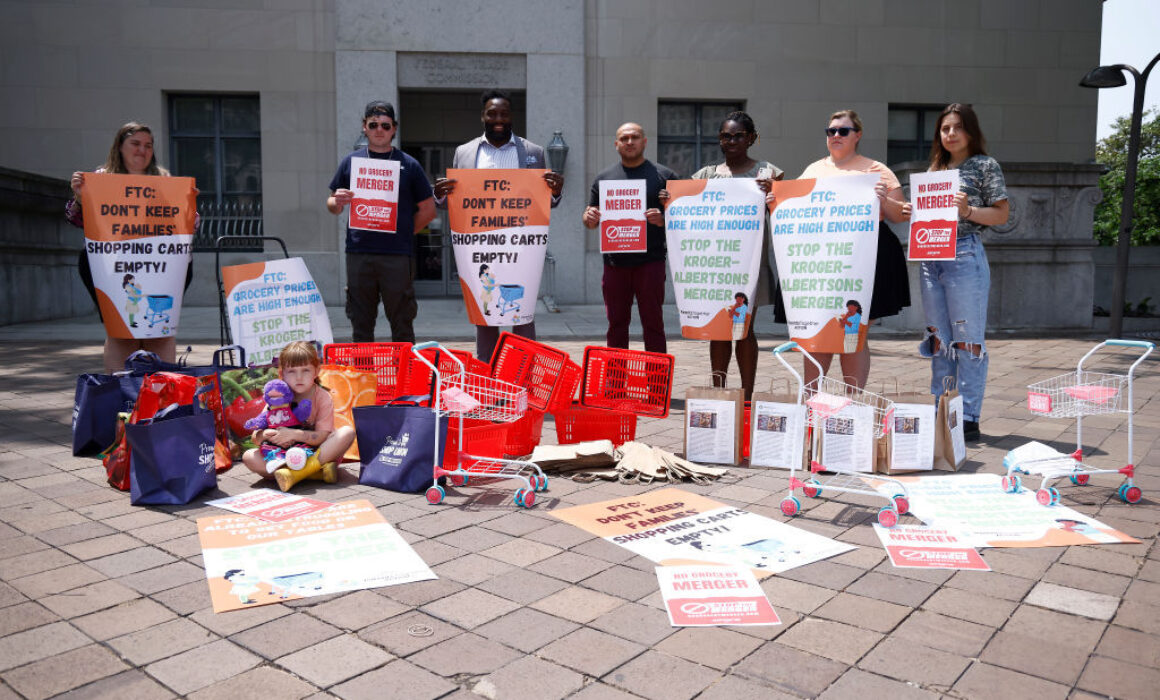Another Test for Antitrust
March 1, 2024
The fight for a more democratic economy continues.
The Roosevelt Rundown features our top stories of the week.
Advocates protest the merger between supermarket chains Kroger and Albertsons after it was first announced in 2023. (Photo by Paul Morigi/Getty Images)
Antitrust from All Angles
The Federal Trade Commission filed suit this week to block the merger of grocery store megachains Kroger and Albertsons—the latest move in an aggressive antitrust enforcement regime that seeks to tamp down corporate power and protect not only consumers but workers. As the FTC’s suit argues, a merger between the two grocery giants could result in higher food prices, shuttered stores and job loss, suppressed wages, and weakened collective bargaining power.
Government regulators face another litmus test in their commitment to fighting market concentration—last week, Capital One moved to acquire Discover, a potential merger of credit card issuers that raises concerns for consumers’ purchasing power. “Are these regulators going to walk the walk, or are they just talking the talk?” Roosevelt Fellow Todd Phillips told Bloomberg Law. “They have talked about being more strict on bank mergers, and we’re going to see whether they’re really living up to that.”
The administration’s recent antitrust successes, along with the revised merger guidelines that focus on more than just prices, are a welcome shift toward fostering a more democratic economy. But more work remains. “Tackling outsized corporate power goes beyond just ensuring markets are ‘free and fair,’” the Roosevelt Institute wrote last year in Sea Change: How a New Economics Went Mainstream. Rebalancing power will mean dismantling the neoliberal idea that corporations should prioritize profits over the well-being of workers and the planet.
Making Banking More Accessible
Last week, Emily DiVito, Roosevelt’s deputy director of democratizing finance, spoke at the CalAccount Blue Ribbon Commission’s public hearing in Oakland, California, about inaccessible banking and the promise of a public option like CalAccount.
As a 2022 Roosevelt Institute brief showed, Spanish-speaking and Black and Latino canvassers received unequal treatment and struggled to access information about low-cost financial products at banks.
“Full, free, and fair access to the money you own, and the financial systems in which it can be safely stored, is necessary to achieve economic security,” DiVito said. Read her full remarks.
What We’re Talking About
📉 The corporate income tax has plummeted from 52.8% in 1968 to a mere 21% today, thus limiting its revenue & regulatory power.@jthorndike‘s look at FDR’s tax ambitions reminds us of the role corporate taxation can play in building an equitable economy: https://t.co/eLMa3Bingg
— Roosevelt Institute (@rooseveltinst) February 29, 2024
What We’re Reading
IL AFL-CIO Puts ‘Captive Audience’ Fight on the Agenda – feat. Roosevelt Fellow Beth Gutelius – Politico
Organizing to Win: Real Change Relies on Grassroots Organizing – Boston Review
With Pandemic Money Gone, Child Care Is an Industry on the Brink – New York Times
History Provides Inspiration for a Stronger Alliance between Labor and Antimonopoly Advocates – ProMarket


